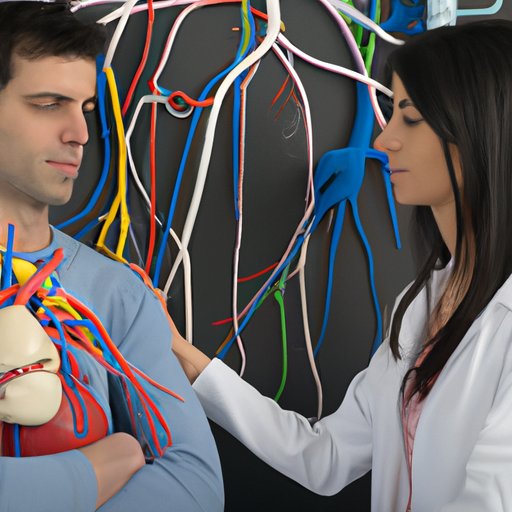Introduction
The human body is a complex system composed of various interconnected organs and systems that work together to maintain homeostasis. Of these systems, the circulatory and nervous systems are two of the most important. The circulatory system is responsible for transporting oxygen and nutrients to cells throughout the body while the nervous system is responsible for controlling and coordinating bodily functions. This article will explore how these two systems interact and the impact their relationship has on overall health and wellbeing.
Overview of the Circulatory and Nervous Systems
The circulatory system, also known as the cardiovascular system, is composed of the heart, blood vessels, and lymphatic system. The primary function of this system is to transport oxygen and nutrients to cells throughout the body and remove waste products from cells. The heart pumps blood through the arteries and veins, delivering oxygen and other essential nutrients to tissues and organs. The lymphatic system is an extensive network of vessels and nodes that transports lymph, a fluid containing white blood cells, around the body to fight infection and disease.
The nervous system is composed of the central nervous system (CNS) and peripheral nervous system (PNS). The CNS consists of the brain and spinal cord and is responsible for controlling and coordinating the body’s functions. The PNS consists of nerves and ganglia and is responsible for relaying messages between the CNS and the rest of the body. Together, these two systems enable the body to respond to changes in its environment.

Summary of the Relationship between the Two Systems
The circulatory and nervous systems are closely connected, with each system having an effect on the other. The nervous system regulates the circulatory system by sending signals to the heart and blood vessels to control blood flow. The circulatory system, in turn, supplies the nervous system with oxygen and nutrients to ensure proper functioning. In addition, the hormones released by the nervous system can have an effect on the circulatory system, influencing blood pressure, heart rate, and blood vessel dilation.
Exploring the Interplay between the Circulatory and Nervous Systems
Overview of the Anatomy and Physiology of Both Systems
The circulatory system is composed of the heart, blood vessels, and lymphatic system. The heart is a muscular organ that pumps blood through the arteries and veins. Blood vessels are tubes that carry blood away from and towards the heart. The lymphatic system is an extensive network of vessels and nodes that transports lymph, a fluid containing white blood cells, around the body to fight infection and disease.
The nervous system consists of the central nervous system (CNS) and peripheral nervous system (PNS). The CNS is composed of the brain and spinal cord and is responsible for controlling and coordinating the body’s functions. The PNS consists of nerves and ganglia and is responsible for relaying messages between the CNS and the rest of the body.
Examining How the Nervous System Regulates the Circulatory System
The nervous system plays an important role in regulating the circulatory system. The autonomic nervous system, which is part of the PNS, is responsible for controlling involuntary processes such as breathing, heart rate, and digestion. The autonomic nervous system sends signals to the heart and blood vessels to control blood flow and regulate blood pressure. For example, when the body is under stress or experiencing excitement, the sympathetic nervous system sends signals to the heart to increase heart rate and blood pressure, resulting in increased blood flow.
How the Circulatory System and Nervous System are Connected
Describing the Neural Pathways Involved in the Process
The connection between the circulatory and nervous systems is mediated by neural pathways. These pathways are composed of neurons, which are specialized cells that transmit electrical signals throughout the body. The neurons in these pathways send signals from the brain to the heart and blood vessels, allowing the nervous system to regulate the circulatory system.
Discussing the Role of Neurotransmitters in this Process
In addition to neurons, neurotransmitters also play a role in the connection between the circulatory and nervous systems. Neurotransmitters are chemical messengers that facilitate communication between neurons. They are released by neurons in response to stimuli and bind to receptors on other neurons, triggering a response. In the case of the circulatory system, neurotransmitters such as adrenaline, dopamine, and norepinephrine are released in response to stress or excitement and act on receptors on the heart and blood vessels, resulting in increased heart rate and blood pressure.

Understanding How the Circulatory System is Affected by the Nervous System
Analyzing the Effects of Stress on the Cardiovascular System
Stress can have a significant impact on the circulatory system. When the body is under stress, the sympathetic nervous system sends signals to the heart and blood vessels to increase heart rate and blood pressure, resulting in increased blood flow. This response is beneficial in the short term, as it helps the body respond quickly to a perceived threat. However, over time, chronic stress can lead to high blood pressure, heart disease, and stroke.
Evaluating the Impact of Hormones on the Circulatory System
Hormones released by the endocrine system can also have an effect on the circulatory system. Hormones such as cortisol, adrenaline, and norepinephrine are released in response to stress and act on receptors on the heart and blood vessels, resulting in increased heart rate and blood pressure. In addition, hormones such as insulin and glucagon can affect the amount of sugar in the bloodstream, which in turn can affect blood pressure.

Examining the Effects of the Circulatory System on the Nervous System
Investigating How Blood Flow Affects Brain Function
The circulatory system also has an effect on the nervous system. The brain relies on a steady supply of oxygen and nutrients from the bloodstream to function properly. If there is not enough oxygen or nutrients in the bloodstream, brain function can be impaired. In addition, if there is a disruption in the normal flow of blood to the brain, it can result in a stroke, which can cause permanent damage to the brain.
Exploring How Oxygen Delivery to the Brain Impacts Cognition
Oxygen delivery to the brain is also important for cognitive functioning. Studies have shown that even brief periods of low oxygen levels can have a negative impact on cognition. For example, sleep apnea, which is caused by a disruption in breathing during sleep, can lead to reduced oxygen levels in the brain and can impair cognitive functioning. In addition, conditions such as anemia and heart disease can reduce oxygen delivery to the brain and impair cognitive functioning.
Conclusion
The circulatory and nervous systems are closely connected, with each system having an effect on the other. The nervous system regulates the circulatory system by sending signals to the heart and blood vessels to control blood flow. In addition, hormones released by the nervous system can have an effect on the circulatory system, influencing blood pressure, heart rate, and blood vessel dilation. The circulatory system, in turn, supplies the nervous system with oxygen and nutrients to ensure proper functioning. Understanding the interplay between these two systems is essential for maintaining good health and wellbeing.
Further research is needed to better understand the complex relationship between the circulatory and nervous systems and its implications for clinical practice. With a better understanding of this relationship, clinicians may be able to design more effective treatments for conditions such as hypertension, heart disease, and stroke.
(Note: Is this article not meeting your expectations? Do you have knowledge or insights to share? Unlock new opportunities and expand your reach by joining our authors team. Click Registration to join us and share your expertise with our readers.)
